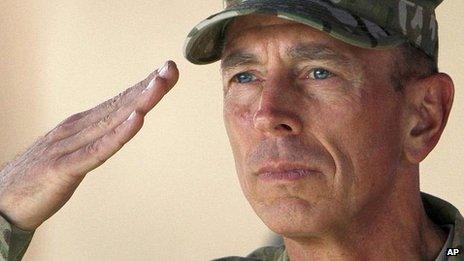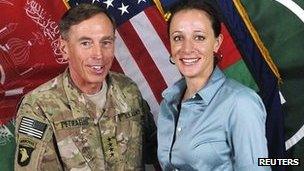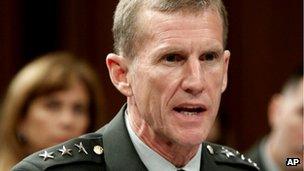Petraeus' downfall - a modern morality tale
- Published
- comments

The fall of David Petraeus, director of the US Central Intelligence Agency (CIA) and the general who successfully commanded America's troop surge in Iraq during 2007-8 is a modern morality tale, even if it did arise from one of the most ancient human failings, marital infidelity.
There are many things about it that have attracted comment from US columnists to the blogosphere: that he oversaw such controversial and costly wars but should ultimately fall on a matter of personal behaviour; that President Barack Obama was not apparently informed until election day that Gen Petraeus was under investigation by the FBI; and that the issue is now drawing in more people, including General John Allen, who replaced Gen Petraeus as the commander of Nato forces in Afghanistan.
Lt Gen Sir Graeme Lamb says General Petraeus actions were "inappropriate, unworthy and disappointing"
The inquiry resulted from complaints by a woman that she had received threatening e-mails from Paula Broadwell, Gen Petraeus' biographer and for several months apparently also his lover. The FBI investigation is now moving on to issues such as whether the author had unauthorised access to classified material.
Some have written of the general's vanity, suggesting he liked to be surrounded by admiring staffers, academics and indeed journalists.
Meeting Ms Broadwell
Having met and interviewed him several times, I can certainly confirm that he took particular care of his image (for example preferring to be filmed favouring the patch on his right shoulder - the combat one of the 101st Airborne Division, which he commanded during the 2003 invasion of Iraq), and that lately his staff tried hard to discourage challenging lines of questioning, whereas during our earlier meetings he had proven more than happy to tackle whatever we threw at him.

Gen Petraeus and Ms Broadwell became close as she wrote his autobiography
It was during one of these later meetings with Gen Petraeus that he introduced me to Mrs Broadwell, who at that time was working on her book about him and with whom, it emerged last week, he was having an affair.
I will not pretend that I had any great presentiment or intuition about what was going on, but did note that during our off-camera conversations, he and I reflected in a humorous way on the ageing process and how it played out in men.
Gen Petraeus had gone through cancer treatment in 2009 and it is in this context that a friend of his, a fellow general, sought to explain to me today what had happened:
"Almost everyone considered him to be immortal, but he had been shaken by the cancer business and continually deployed for five-and-a-half years."
The same officer concluded that while his friend was right to offer his resignation once the extramarital affair with Ms Broadwell had come to light, that "the president shouldn't have accepted it".
Some reports today suggest that the CIA director did not even himself feel it was a resigning matter, but was persuaded to write the letter by the Director of National Intelligence, James Clapper.
The head of the wider US intelligence community apparently felt it would not be possible for Gen Petraeus to discipline CIA staff accused of marital indiscretions, if he had shown himself fallible in the same regard.
Gen McChrystal's resignation
General Stan McChrystal, Gen Petraeus' predecessor as Nato commander in Kabul, also suffered a public fall from grace in 2010, stepping down after staff members were quoted by Rolling Stone magazine being critical about the Obama administration.
Some used a similar formula at the time, about the president not needing to accept a tendered resignation.

Gen McChrystal was eventually cleared of wrongdoing over a magazine article
Both generals had been lionised in the US press and in Congress, particularly for reversing the slide to civil war in Iraq.
It is also true to say that many of the commanders, including British as well as American, whom I have spoken to in Iraq and Afghanistan were completely in awe of these two men and their abilities.
As for what they achieved in their attempt to replicate the success of the Iraq surge in Afghanistan, that is a different matter, for many now consider it to have failed.
That two commanders who wielded power of life and death over so many, and were widely praised as soldier-scholars, should fall on issues of PR and an affair is itself a stark measure of the degree to which personal failings that might once have been kept private can now be the decisive factors in professional ruin.
And how serious are the charges that led to their fall? The FBI cleared the CIA boss of any involvement with sending threatening emails, even if he still has serious issues to address with his wife Holly Petraeus.
And an inquiry into Gen McChrystal's conduct towards the Rolling Stone reporter exonerated him of any misconduct.
Some once talked of Gen Petraeus - his physical fitness, charging intellect, and devotion to duty in almost super-human terms. Ultimately though he has proven himself all too fallible.